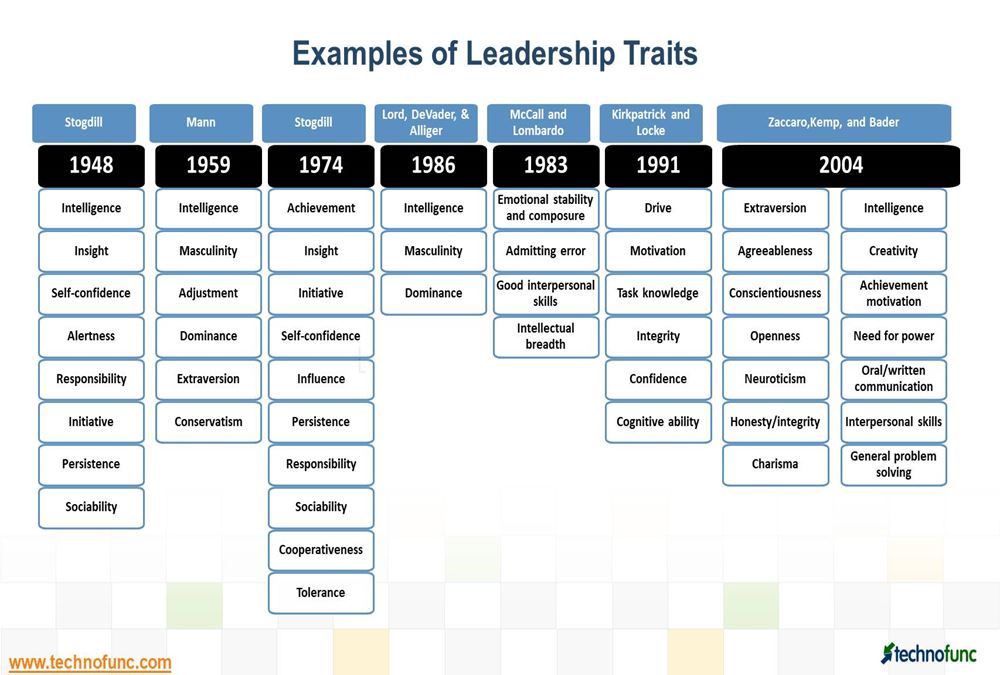- Home
- Business Processes
- Industry Knowledge
- Aerospace Industry
- Automotive Industry
- Banking Domain
- BFSI Industry
- Consumer/ FMCG Industry
- Chemicals Industry
- Engineering & Construction
- Energy Industry
- Education Domain
- Finance Domain
- Hospitality Domain
- Healthcare Industry
- Insurance Domain
- Retail Industry
- Travel and Tourism Domain
- Telecom Industry
- Leadership Skills
- eLearning
- Home
- Leadership
- Creativity Tools
- Leadership Traits – A great List
Leadership Traits – A great List
What are the qualities and characteristics of a good leader? Great leaders possess core leadership traits and skills. The list includes the most important leadership qualities and skills to look for in a great leader. These are must-have traits of a powerful and successful leader, the qualities a leader possess to be great.
A broad classification to six categories of traits is also done below:
Physical Characteristics of the Leader:
- Age
- Height
- Weight
- Alertness
- Energetic
- Masculinity
- High energy level
- Physical stamina
- Tolerance for stress
- Not concerned about being overworked
- Vitality
Background Characteristics of the Leader:
- Education
- Social Status
- Mobility
- Experience
- Experience in a variety of different types of situations
- Broader perspective
- Expertise in dealing with different types of problems
- Competent and skilled
Intelligence Characteristics of the Leader:
- Ability
- Judgment
- Knowledge
- Clever (intelligent)
- Conceptually skilled
- Creative
- Knowledgeable about group task
- Intellectual breadth
- Insight
- Learns from experience
- Adapts to change
- Good judgment
- Foresight
- Intuition
- Creativity
- Self-knowledge
- Coordinator
- Objective
- Decisive
- Asks for more responsibility
- Knows how to delegate
Personality/Emotional Characteristics of the Leader:
- Aggressiveness
- Alertness
- Dominance
- Decisiveness
- Enthusiasm
- Extroversion
- Independence
- Self-confidence
- Authoritarianism
- Assertive
- Tolerant of stress
- Conservatism
- Desire to improve
- Understands own strengths and weaknesses
- Self-objectivity
- Emotional intelligence
- Self-awareness
- Empathy
- Self-regulation
- Ambitious
- Courageous
- Knows self
- Risk taker
- Not intimidated by superiors
- Personal competence
- Optimistic
- Exhibits concern for others
- Encourages and engages opposing viewpoints
- Constant and reliable
- Self-disciplined
- Determination
- Need to achieve
- Caring
- Empathizing
- Constancy
Task-Oriented Characteristics of the Leader:
- Achievement Needs
- Responsibility
- Initiative
- Persistence
- Ambitiousness
- Achievement-orientated
- Decisive
- Persistent
- Willingness to assume responsibility
- Organized (administrative ability)
Social Characteristics of the Leader:
- Sociability
- Supervisory Ability
- Cooperativeness
- Popularity
- Prestige
- Tact
- Diplomacy
- Adaptability
- Adjustment
- Cooperative
- Dependable
- Tactful
- Persuasive
- Socially skilled
- Emotional stability and composure
- Good interpersonal skills
- Well-adjusted
- Oriented toward improving self
- Detached
- Honest
- Ethical
- Trustworthy
- Behavioral flexibility
- Understanding
- Empathy
- Social Insight
- Charm
- Tact
- Diplomacy
- Persuasiveness
- Listener
- Collaborative
- Strong motivator
- Cooperative
- Influencer
Communication:
- Ability to communicate
- Ability to articulate a vision
- Ability to persuade others
- Communicate purpose
- Communicate direction
- Communicates passion to others
- Good communication skills
- Use metaphors
- Experts at one-to-one communication
- Superior speakers
- Excellent writing skills
- Creates and maintains a communications network
- Has people keep them informed on problem situations
- Networks with people inside the organization
- Maintains contacts outside the organization
- Doesn’t depend on only one source for information
- Able to communicate with key individuals
- Eager to explore new approaches to their work
- Are not fuzzy about results, interested in ways to track their progress
- Communicates persuasively

Related Links
You May Also Like
-
Self-leadership is a normative model of self-influence by the use of several behavioral strategies to gain a comprehensive self-influence perspective about oneself. Self-leadership is developing an understanding of your capabilities and abilities to influence your own communication, emotions, and behaviors to lead and influence others. Self-leadership is about personal growth and developing foresight.
-
Self-Fulfilling Prophecy (SFP) Leader Theory
Pygmalion theory of Leadership is a model of SFP at work involving supervisory expectancy based on the pygmalion effect. This effect is a type of self-fulfilling prophecy (SFP) in which raising leader's expectations regarding subordinate performance boosts the group's performance. Managers who are led to demand more from their team, lead the team to better performance. There is some evidence that the SFP effect does exists.
-
According to Environmental theories of leadership, a leader needs to deal effectively with environmental complexities and lead in a certain style as a result of environmental responses. Environmental influenced leadership demand leaders to learn how to adjust environmental factors. Leaders also have the responsibility of creating the right kind of environment for their followers by focusing on environmental factors and pressures.
-
Theory Z also called the "Japanese Management" style is a leadership theory of human motivation focused on organizational behavior, communication, and development. It assumes that employees want to enter into long term partnerships with their employers and peers. Offering stable jobs with an associated focus on the well-being of employees results in increased employee loyalty to the company.
-
The skills approach to leadership suggests that certain skills are important for effective leadership. Skills are what leaders can learn and develop, whereas traits are innate characteristics. The main skills needed for leadership, according to one such theory, are technical, human, and conceptual.
-
Leadership Traits – A great List
What are the qualities and characteristics of a good leader? Great leaders possess core leadership traits and skills. The list includes the most important leadership qualities and skills to look for in a great leader. These are must-have traits of a powerful and successful leader, the qualities a leader possess to be great.
-
The development of teams is an ongoing process because the composition of the team may keep on changing. The new members may join and the old members may leave the team. The team members pass through several stages for the development of the team and there has been a lot of research to identify these stages. In this article, we discuss the common theories of team development.
-
Jung first introduced his personality theory and explained that all humans have a natural impulse to relate meaningfully to the world through productive work and people through significant relationships. He used four psychological functions - thinking and feeling (rational functions) and sensation and intuition (irrational functions). He also used introversion and extraversion and its impact on appropriate leader behaviors.
-
Authentic leadership is a new approach to leadership in which leaders are genuine, self-aware, transparent, build honest relationships, and work on an ethical foundation. Authenticity is one of the core values of leadership. Authentic leaders have truthful self-concepts and they inspire by promoting openness by acting in a real, genuine, and sincere way. Authenticity requires self-awareness and the ability to act in accordance with one's true self.
-
The group and exchange theories of leadership are derived from social psychology. These have their roots in the exchange theory. Leaders from different kinds of relationships with various groups of subordinates. Group theories describe how leaders need to maintain their position in group dynamics.
Explore Our Free Training Articles or
Sign Up to Start With Our eLearning Courses

About Us
Learning
© 2023 TechnoFunc, All Rights Reserved










